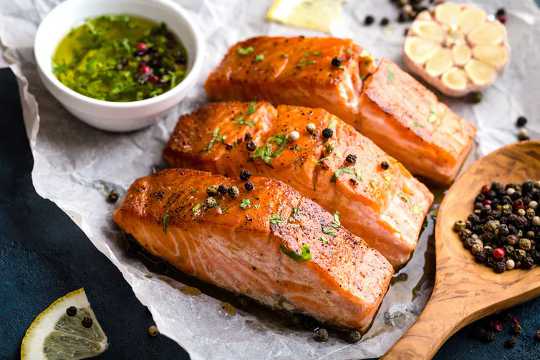 Oily fish, like salmon, are a good source of omega-3 fatty acids. Elena Eryomenko/ Shutterstock
Oily fish, like salmon, are a good source of omega-3 fatty acids. Elena Eryomenko/ Shutterstock
Omega-3 fatty acids are often touted for their reported benefits to many important aspects of health – especially for our heart. Now, our recent study has uncovered another potential benefit of omega-3s. We found that greater dietary intake of certain types of omega-3 fatty acids may reduce the risk of a child developing asthma in adolescence.
Asthma is the most common chronic condition in childhood. While we have treatments to control the disease in most patients, there’s still no cure for asthma – which is why potentially preventing it from developing in the first place could be life-saving for some.
Our team wanted to investigate whether diet during childhood was linked to a child developed asthma. To do this, we used data from the Children of the 90s cohort, which has tracked the health of more than 4,000 children born in the early 1990s.
We analysed their intake of two types of long-chain omega-3 fatty acids – knowns as EPA and DHA – from fish at seven years of age. We estimated their intake using a questionnaire. We then tracked the incidence of new cases of doctor-diagnosed asthma when these children reached 11-14 years of age.
Get The Latest By Email
Our bodies can’t make much EPA and DHA, and so we need to get them from our diet. These fatty acids are mainly found in oily fish, such as sardines, mackerel, herring, and salmon.
We found that intake of EPA and DHA from fish was not associated with asthma risk in the cohort as a whole. However, about half the children in the study carried a particular variant of a gene called fatty acid desaturase. When we restricted our analysis to children with the variant, we found a striking reduction in asthma risk in those who consumed the most dietary omega-3s. Children with this gene variant, who consumed the equivalent of at least two servings of fish per week, had roughly half the risk of developing asthma compared to those who rarely consumed fish.
 At least two servings of fish a week were associated with lower risk. Ann in the uk/ Shutterstock
At least two servings of fish a week were associated with lower risk. Ann in the uk/ Shutterstock
Fatty acid desaturase is an enzyme which converts other omega-3s into EPA and DHA. However, people with this particular variant of the fatty acid desaturase gene have inefficient production of EPA and DHA in the body, leading to low levels of them in the blood.
We were looking for this gene interaction because, if children with this gene variant have lower levels of EPA and DHA, they should benefit the most from a higher dietary intake of these omega-3 fatty acids. And this is exactly what we found. We then replicated our UK findings in a separate cohort of children in Sweden.
While we can’t say for certain that eating more fish will prevent subsequent asthma in children based, we have identified a plausible mechanism. EPA and DHA are known to have anti-inflammatory properties. Since asthma is an inflammatory disease of the airways, this means a higher dietary intake of these omega-3 fatty acids might prevent asthma by reducing airway inflammation.
The next step of our research will be to see whether, in the same UK cohort, we can find evidence to suggest that a higher intake of these omega-3 fatty acids is also associated with a lower risk of asthma attacks in children who already have the condition.
While further research will be needed to see if we can confirm such an effect, there is nothing to be lost in the meantime by advising parents to encourage their children to consume more fish.
About The Author
Seif Shaheen, Clinical Professor of Respiratory Epidemiology, Queen Mary University of London
This article is republished from The Conversation under a Creative Commons license. Read the original article.
books_food







